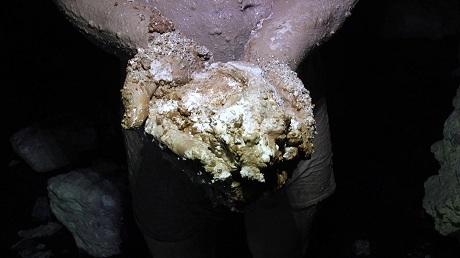Travelling through the green nature of Garmiyan area you can discover one of Kurdistan's hidden gems. I had to take paved and at some times rough roads to find what I was after: mineral water in a pond near the town of Sangaw. It wasn’t easy. The pond was more like a pit. Local youth helped our group use ladders to descend into the complete darkness, so dark we needed torches.
After wandering through down into caverns at least 100 meters, we could hear the roar of water, where we found a pond of sulfur water. The others took off their clothes and dove in to the deepest part of the underground reservoir.
Yasin, a local from Sangaw, covered himself with mud from the bottom of the pond. It was his first visit, but had been told the water and mud is beneficial for skin. He and others told me they do this to “cure many diseases.”

Natural remedies exist in every culture. Most modern medical doctors downplay their benefits or explain them through scientific means. “We shouldn’t expect much from natural remedies,” Dr. Shakhawan Mohammed , a specialist in cosmetics and skin diseases told me. But these natural resources have been used by people for thousands of years.
Regardless of a proven or just a perceived benefit, many countries have entire industries centered on holistic, natural, and homeopathic cures. Some of these are health spas or resorts, where people with rheumatoid arthritis, skin, breathing, or other problems go for relief. The town of Pamukkale (Hierapolis) is known for its geothermal springs left by carbonate minerals, and temperate climate in southwestern Turkey near Denizili. It is a UNESCO World Heritage Site.
There, I visited with a doctor named Murad Maysun who supervises a health center there where tourists from across the globe visit. He said: “Water and mud from here is special. It is full of minerals which are useful for skin and joints.” He along with other doctors and staff sit among people in the waiting hall. They believe doctors shouldn’t have their own rooms. Rather, they should sit among relatives of patients to be ready to help if need be. One patient I met is a 4-year-old named Hevi. He uses the natural therapies there and is completely calm — no crying or thrashing like young children often do in a hospital or doctor’s office.
Dr. Murad keenly asked me about the mineral waters of the Kurdistan Region. He was surprised to learn that there are no big centers in the Kurdistan Region, despite its resources. Little work has been done to study the three types of springs in the Kurdistan Region — salty, sulfuric, and sweet (or mineral). If the Kurdistan Region wants to develop, its moderate climate, caves, springs, and waters could give rise to similar facilities like that in Pamukkale.
Dr. Aras Bradosti is the head of the Rudaw Health Desk.



Comments
Rudaw moderates all comments submitted on our website. We welcome comments which are relevant to the article and encourage further discussion about the issues that matter to you. We also welcome constructive criticism about Rudaw.
To be approved for publication, however, your comments must meet our community guidelines.
We will not tolerate the following: profanity, threats, personal attacks, vulgarity, abuse (such as sexism, racism, homophobia or xenophobia), or commercial or personal promotion.
Comments that do not meet our guidelines will be rejected. Comments are not edited – they are either approved or rejected.
Post a comment